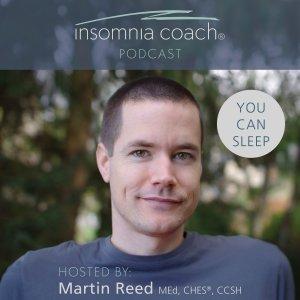Insomnia Coach® Podcast

How Sara got rid of her insomnia, got off sleeping pills, and now averages seven hours of sleep each night (#9)
Listen to the podcast episode (audio only) Sara lived with insomnia for a year and resorted to sleeping pills because she didn't know how to improve her sleep. Luckily, Sara did discover cognitive behavioral therapy for insomnia — and after just eight weeks of implementing CBT-I techniques, she went from averaging four hours of sleep each night to six hours of sleep each night. One year later, Sara now averages seven hours of sleep and no longer takes sleeping pills. In this episode, we'll learn more about how Sara got her sleep back on track and how she regained confidence in her ability to sleep. Click here for a full transcript of this episode.Click here to hide the transcript. Martin Reed: Welcome to The Insomnia Coach Podcast. My name is Martin Reed. I believe that nobody needs to live with chronic insomnia and that cognitive behavioral therapy for insomnia (CBT-I) techniques can help you enjoy better sleep for the rest of your life. Martin Reed: Thank you so much, Sara, for coming onto The Insomnia Coach Podcast today. Sara Flaherty: It's okay. No problem. Martin Reed: Can you start off by just telling us when your sleep problems first began? Sara Flaherty: It was the summer of 2017. I've suffered from health anxiety for a long time, but it was particularly significant then. And from having been a person to have perfect sleep and could sleep anywhere at any time, I suddenly started waking up in the night with these health worries and then just got a massive fear that I couldn't go back to sleep. And it sort of escalated from that summer. Martin Reed: Yeah. So was your main difficulty just falling asleep at the start of the night, or was it more to do with you'd just find yourself waking during the night and then just finding it really hard to fall back to sleep? Or maybe both? Sara Flaherty: It was a little bit of both, but more when I woke up in the night. Sometimes, though, I couldn't go off to sleep initially, and then even waking in the night, I still couldn't go back to sleep. But mostly it was waking in the night and then not being able to go back at all. Martin Reed: Do you think that you had difficulty falling back to sleep or just falling asleep at the start of the night because you were worried about health issues, or was it specifically you were worried about sleep? Or maybe it started off as one and progressed into the other? Sara Flaherty: It started off as one. It started off with waking because I was worried about certain things, but then it got to the point where that was sort of at the back of my mind more and the fact that I couldn't sleep was the big fear. I'd wake up and I'd think, "Oh my God. I can't go back to sleep. I've got to function tomorrow. I've got to go to work. What am I going to do?" And then I just couldn't go back to sleep. Martin Reed: Yeah. How long was this going on for before you... For people that don't know that you enrolled in my online coaching course, how long were you experiencing these issues with sleep before you found out about cognitive behavioral therapy for insomnia techniques? Sara Flaherty: It was about a year I had poor sleep, and it got to the point where it was affecting my life so badly I just knew I had to do something. So I Googled and tried to get some research on techniques to help me, but I felt I needed more than that. Where I live, there's not a lot of support for anything psychologically as a problem. So I just had to find some help. So that's what I did. Martin Reed: Before you found me, before you found out about CBT-I,






 Visit Podcast Website
Visit Podcast Website RSS Podcast Feed
RSS Podcast Feed Subscribe
Subscribe
 Add to MyCast
Add to MyCast